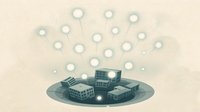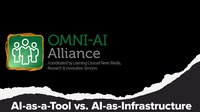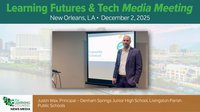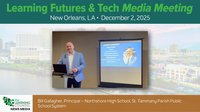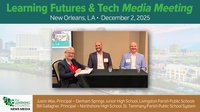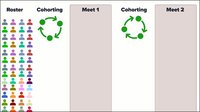This article is one of my take-aways from the Sept. 14th Digital Curriculum Sustainability Discussion meetings out in Denver. Right now, educators and students are faced with nearly infinite choice for learning objects on the internet. Today there are tens of thousands of offerings, from reputable companies, of individual chunks of knowledge, courses, courseware, and whole library collections of eBooks surrounded with software guiding a student’s journey through their reading adventures. Beyond that is a universe of anything and everything. It practically stretches to infinity.
Education is an enterprise largely built on a foundation of two-valued logic. You are either educated, or not-educated. You learned something or didn’t learn it. You go to public or private schools. Some piece of knowledge is either “right” or it is “wrong.” Selection and maneuvering the landscape of all human knowledge has been the province of institutions and teachers as “active source” versus students as null and passive recipients. Teachers and schools either make or buy digital resources, very few hybridize. Publicly, the education industry considers itself sovereign in purveyance of knowledge, and all other avenues mere pretenders. Humans build a view of the world on the certainty that two-value logic gives us, but the internet now brings us a relentless and seemingly infinite wave for types of resources and topics and channels.
This is so very uncomfortable for the certainty of many people, who seem to desperately need things to be one-way-or-the-other, no third option. It is the ultimate in terror to consider an infinity of options for them. Take for example what Ben Fobert, the principal of Mountain House High School states in this article and video about how they have utterly shifted schedules to alter "time and space" for students:
Video: Transforming Education at Mountain House High
Look at the world and how it is changing. Schools themselves are now often the victims of the human predilection towards the lowest-level reasoning, two-valued logic. Schools are often labeled either “good” or “bad.” Too often this is based on rumor, scant amounts of data, like just one high-stakes test, or a single piece of stupidity that made the local news. Could it be that Education’s incorporation of too much two-valued logic and not enough of infinity-based logic be creating an adverse effect? Yes. Although it didn’t used to.
What’s astonishing is that schools and teachers are labeled “bad” at a dramatically increasing rate.
The reason will surprise you in that “no duh,” “knew it!” sort of way.
It’s because of the internet and a smart phone in the hands of literally everyone from a very young age. (Ta da!)
At the Denver discussion event, Jacqueline Lee, a Senior Manager at T-Mobile, asked the audience if anyone slept with their phones. About 30 percent of people raised their hands – and these were adults. The numbers for younger people are much higher.1
People are expecting the infinite because they have been exposed to the internet and literally carry it around everywhere. They expect such services as being able to ask their device a spoken question and get an answer.
If you can see our communal history of thinking in only two values as part of the very fabric of Education, you have a shot at grasping the starting-point-of-logic for executives and leaders to take their institutions to real digital transition. Its infinity-based logic, applied on every level.
Infinity-based logic does not assume only two values, it assumes there are always many, probably unlimited, and actually, “beyond comprehension.”
The change in consumer behavior is leading to people assuming that the general offering by schools of a one-size-fits-all limited menu of the “right” knowledge pat hs, is a stifling construct. We already know this is leading to new constructs, Charter schools, online schools, and hybrids of all kinds. It’s freaking people out and shaking their certainty. This is the same thing that happened to JC Penney, Sears, and countless others over in the retail sector. As consumer offerings on the internet reach out and find their way onto learner devices in the form of Apps, courseware and learning objects, people are figuring out that there is an infinite array of options without a lot of fuss. A silent revolution is happening.
hs, is a stifling construct. We already know this is leading to new constructs, Charter schools, online schools, and hybrids of all kinds. It’s freaking people out and shaking their certainty. This is the same thing that happened to JC Penney, Sears, and countless others over in the retail sector. As consumer offerings on the internet reach out and find their way onto learner devices in the form of Apps, courseware and learning objects, people are figuring out that there is an infinite array of options without a lot of fuss. A silent revolution is happening.
What if the concept of infinity-based logic gets applied at every level in Education?
Infinity of Sources
First, institutions being the province of all knowledge will go by the way-side. Software can offer a pathway directly and give a credential at the end, no different than a lot of the human resources required training in many States for employers on discrimination. Some of the highest skilled training anywhere is done by the Airforce for jet fighters with virtual reality software, so the idea of teacher-centricity is in question. In a lot of programs, you either get a “pass” or you must start over. Employers can monetize their own costly internal training by offering it to other companies at a profit. The internet changes the dynamics of the cost-to-market equation, reducing it nearly to zero in many instances. The infinity of potential sources has already begun.
Infinity of Completions
Second, being educated or not-educated as a concept, will end. Instead, being educated will never be done, and frequently will be “just-in-time” for a new project or new job. We already do this with recipe look-up and self-help health. In addition, corporations are already fairly disabused of the idea that a degree really got them value in who they hired because change is such a constant now. They are turning to more old-fashioned evaluation of the character of applicants.2 This is set-up for a new value paradigm of learning that disengages it from a time-constant or attendance-constant.
Infinity of Rigor
Learning or not learning something will be a condition of how good the user-interface and user-design is in the creation of the curriculum, and how well human expert teachers are leveraged in at precise moments to ensure achievement. There will be a new and rather artistic interpretation of what rigor can and should be. It opens the door to an increase in teacher employment, particularly subject-matter specialists.
Infinity of Mixing
Choice between limited institutions will become an infinity of using some institutional learning and mixing it up with a lot of paid and free non-institution learning. “Chunking” as many aspects of the institution’s learning choices, all the way down to paid-for office hours with teachers, and much more, will be a means of remaining relevant. Hyper helicopter parent will love, love, love this consumer-oriented aspect, while many others will feel exhausted by it the same way they easily reach choice-exhaustion in other markets like computers, healthcare, automobiles, etc. It will be overwhelming after the novelty wears off, but the Learning Counsel predicts that this is a decade or two away and all schools are going to live through a perfect storm of “mixing” wrought by the internet.
On the plus side, there will be one indisputable truth as we leave two-valued logic into an infinity of options. (I find it interesting that as infinity erupts, something else becomes a singular truth.)
Singular Indisputable Truth of the Future: Someone knows better than you. 
Humans tend to agree that someone has discernment about any given topic, and can say with certainty the rightness or wrongness of it. Even if that person is, in fact, wrong, others will seek to absorb their certainty. When there is an infinity of options in the knowledge arena, the highest sought service of all will be discernment between the right stuff and wrong stuff. It will be paid for, sought out, and revered. It will be a skill sought by all.
The well-crafted, well-articulated and thoroughly defended knowledge proposition in a curriculum, will be the saving grace of any school. It will be egalitarian and non-authoritarian. It will propose some things you can’t get anywhere else, like thrilling experiences and maker-spaces of all kinds. It will be publicly available to know about with broad and relatable marketing, not hidden and shushed. Your digital curriculum roster of resources and caped-crusader-like or rock-star-esque teachers will be part of the school’s online identity. This is because your online “face” will be your most key marketing feature, and the functions of that online spot will be numerous.
You as an institution will be a consumable in a mix-and-match world. You will offer a school-ish experience on steroids.
Becoming this as a school, as an ideal, is no different than Amazon corralling nearly every type of retail into one iconic virtual spot with links off into infinity. Schools will need to be doing the same thing with their physical buildings as experiential hubs via their online spot. That means they are starting at where Amazon has just arrived – now with physical stores from the buy-out of Whole Foods for the first time. Schools are going to be mini Amazon’s-of-learning, only backwards, being buildings first and then online. Upcoming generations will know them first as online places, and from those, decide to arrive or not for any scheduled necessary teaching moment. Do you see this flip in perspective? It’s rather a majestic turn in thinking.
In our September 14th Digital Curriculum Sustainability Discussion meeting in Denver, Josh Hirsch, Educational Technology Coordinator at Mapleton Public Schools, told everyone in the room that his take-away from the discussion that day was that “it was time for schools to Amazon-up.” I believe he also said, “I’m trademarking that,” to which everyone in the room chuckled.
You go, Josh, because you just said something that is exactly on point for schools to hear. Trademark it.
###
1. “Have Smartphones Destroyed a Generation? More comfortable online than out partying, post-Millennials are safer, physically, than adolescents have ever been. But they’re on the brink of a mental-health crisis,” Jean M. Twenge, September 2017 Issue. https://www.theatlantic.com/magazine/archive/2017/09/has-the-smartphone-destroyed-a-generation/534198/
2. “ Why Google doesn’t care about hiring top college graduates,” February 24, 2014, Quartz, Max Nisen, https://qz.com/180247/why-google-doesnt-care-about-hiring-top-college-graduates/
3. https://www.goodreads.com/author/show/4.Douglas_Adams
4. https://www.goodreads.com/author/show/12732.Grant_Morrison
5. https://www.goodreads.com/author/show/3164882.Mehmet_Murat_ildan
Other sources:
“Reduction of Arithmetic to Logic Based on the Theory of Types without the Axiom of Infinity and the Typical Ambiguity of Arithmetical Constants,”, Ludwik Borkowski, Studia Logica: An International Journal for Symbolic Logic, T. 8 (1958), pp. 283-297 Published by: Springer, http://www.jstor.org/stable/20013614
Quotes source: https://www.goodreads.com/quotes/tag/infinity


